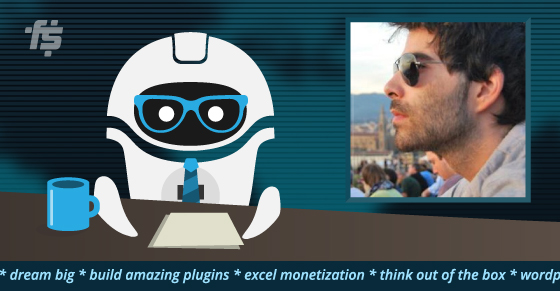I just returned from two weeks of intense traveling, which started with WordCamp Riga, where I gave the opening keynote – A Crash Course On Building A Sustainable Plugin/Theme Business in The Subscription Economy spiced up with a trip to Nashville for WordCamp US. While I’m tempted to write about how awesome my trip was, the friends I met, yadda, yadda, yadda – the usual WordCamp recap – after Matt Mullenweg’s State of the Word at WordCamp US, where we watched a 15 min live demo of the “Future of WordPress”, I decided that it’s time we covered Gutenberg from the perspective of the commercial products space.
Here’s the live demo by Matias Ventura, the project lead:
Since my expertise is in monetization and does not specifically relate to the WordPress editor, I decided to reach out to the founders and CEOs of the most popular page builders: Beaver Builder, Elementor, Divi Builder, and Visual Composer.
Luckily, I had spent a few days with the Visual Composer team at Riga, and I know the Elementor team before Elementor was even born. Robby and I hung out together in multiple WordCamps, and I had met with the Divi team when I was visiting San-Francisco in 2016.

The picture above is quite legendary and was taken after the WordCamp US’ after party. Unfortunately, the ”Beavers” were not around to make it complete. So here’s the complementary one of Brent and Robby from Beaver Builder, and Yoni from Elementor:

To Gutenberg, or not to Gutenberg, that is the question…
Gutenberg is an important move for WordPress’ market growth. I’ve been saying it for a while, and mentioned it on my interview on Kinsta from June – I think that WordPress is already the go-to solution for most web agencies and freelancers – tech-savvy users. The thing is that most of the users out there are not web developers and are not considered as “power users”. The WordPress interface ease-of-use is far behind WiX, Squarespace, and a dozen other WYSIWYG website builders. You don’t need to be a UX expert to tell that the WordPress admin dashboard is overwhelming. And that’s why I think we see the gold rush of page builders.
“It has been a year and a half since we first introduced Elementor to the WordPress community. We are glad WordPress is also making progress with the Gutenberg project. This brings an important functionality to millions of users, and new challenges for theme and plugin developers.
I believe that Elementor’s unique vision of design is just in its early stages, and there is a lot of room for innovation. We will find the best path to work alongside the new editor, and keep leading the field of WordPress design.
My estimate is that the Gutenberg project will contribute to WordPress’s continual growth as the #1 CMS in the world.
Yoni Luksenberg, CEO & Co-Founder at Elementor
Moving towards a WYSIWYG approach with Gutenberg helps seize the “mom and pop shops”. This is great news for commercial plugin and theme developers because we are going to see more people using WordPress!
More users -> A larger market share -> more $$
Gutenberg brings great news for commercial plugin and theme developers because we are going to see more people using WordPress!
Generation of “Block” Plugins Is Around The Corner
Gutenberg introduces a new concept of blocks where users can embed widget-like blocks anywhere they like in the page. It’s still hard to foresee all the possible use-cases, but it will definitely make an interesting ecosystem with a new breed of micro-plugins.
Time to Seize Your “-block” Slug from WordPress.org!
The current terminology for widgets or page elements that are used by Gutenberg is “blocks”. It’s too early to know which exact phrase will rule when users will be searching for Gutenberg components, but this is the best time to bet and capture a lucrative slug on WordPress.org and hopefully piggyback on the organic traffic that it will generate.
Grab a free copy of our Cheat Sheet for
Selling Plugins and Themes
A growth roadmap with concise, actionable tips for every milestone of WordPress product development.

I covered the WordPress.org SEO topic profoundly, earlier this year, and the slug is still very important to the ranking of your products! So for example, if your WordPress plugins business is in the forms space, capturing the slug contact-form-block can be great for you (assuming that “block” will be the terminology that will catch on). Obviously, you can’t just capture the slug, you’ll actually need to submit a functioning plugin. That said, it can be an initial/alpha version 😉
Plugin Developers – Get Ready!
Matt is pushing Gutenberg ahead in full-power. If you are a plugin developer and still haven’t explored Gutenberg – now is the time! Moreover, start preparing for the Gutenberg era — if your plugin won’t be compatible with the new editor your product is going to stay behind.
“We’ve been keeping our finger on the pulse of Gutenberg’s progress and do our best to jump in and help lend our expertise to the project when we can. Gutenberg has the potential to disrupt the markets that we and our users serve, but its success is important to the WordPress project. We want Gutenberg to be successful as much as we want WordPress to be successful.
We’re looking at different ways we can embrace and extend Gutenberg and we have the benefit of being a fast and agile team. It’s still unclear exactly what the final product is going to accomplish (are we trying to be like Medium or Squarespace?), but we’re ready and prepared to adapt as needed.
During the State of the Word, I was impressed with the Gutenberg demo and it was encouraging to hear the excited rumblings in the crowd. The perception of Gutenberg is slowly shifting from fear to excitement in the community.
Matt mentioned that they’re designing Gutenberg for new users. I think there’s always going to be another level of customization and features that Page Builders can provide. Hopefully, Gutenberg will successfully increase WordPress’ market share. When those new users are ready to take their designs to the next level, we’ll be there!
Thinking about how Gutenberg might affect the commercial theme market, we’re excited to learn more about the new core Gutenberg Theme. The core team is obviously thinking far out into the future in their approach to building Gutenberg. Seeing how they envision Gutenberg interacting with a Theme will hopefully shed more light on their idea of best practice and what the WordPress “theme” of the future might look like.”
Robby McCullough, CEO & Co-Founder at Beaver Builder
Is Gutenberg Going to Kill Commercial Themes?
I had LOTs of discussions about Gutenberg with key people in our community. Some say that commercial themes will become obsolete in a year. I don’t think that’s the case.
“With opinions like Joost’s out there we couldn’t agree more about the unnecessary rush from the Gutenberg team to push editor into the core. The results may be dramatic for the end customer who will suffer from multiple compatibility issues. At the same time, we are excited about the modules to allow a standardization of things. That would probably be a good step to take, before the entire Gutenberg project.
As Gutenberg is not really a frontend editor, builders like Visual Composer will still keep the strong position in the market. Of course, we expect to have a small drop upon initial release. At the same time, with all the focus on builders, the community seems to forget that the next step is the Gutenberg base theme, which may hit a much larger group of WordPress professionals out there.”
Michael Makijenko, CEO & Founder at Visual Composer
I (Vova) think that the typical user who starts a website is always going to start with a “pretty design”. Non-tech-savvy users (which comprise most of the ecosystem) don’t care about Gutenberg, the customizer, or page builders. They focus on finding a theme that visually addresses their needs.
In my humble opinion, commercial themes are not going anywhere. What I do think is that we are going to see more and more themes built on top of frameworks. Whether the framework is Gutenberg, Genesis, Visual Composer, or any of the other builders, it will become way easier to turn PSD designs into functional themes. While it means that we’ll see a growth in the WordPress themes inventory, this is great news for website owners, since editing the theme will become a simple WYSIWYG task.
Conclusion
Since its initial announcement, we’ve all been following the development of the Gutenberg project in awe. Some of us have been worrying about how it may affect their WordPress-based commercial product business, while others are wondering where it is all going, and what the future holds for the wonderful WordPress ecosystem. While I can definitely understand those who may be showing signs of stress and concern, I tend to look at these things differently, and instead of fearing the head-on collision of Gutenberg with my WordPress product business – I would try to understand how to turn a threat into an opportunity.
Instead of fearing the head-on collision of Gutenberg with your WordPress product business – try to understand how to turn a threat into an opportunity.
If you’re a plugin developer and are like me in that aspect then I suggest you get to work, or at least get to thinking about it. I’ve provided a few of my thoughts and predictions above, and I think commercial WordPress plugin developers would be wise to check those out and consider acting upon them (before someone else does). Should you create a WordPress “block” plugin that extends one of Gutenberg’s capabilities? If so, which capability/problem will you focus on? Can you pick out something that is important enough for people to need to use on their websites, but at the same time isn’t likely to be handled by the core Gutenberg team anytime soon?
If you’re a theme developer who has not yet upgraded their development workflow into the new, fast and improved manner of creating page-builder-based WordPress themes, I suggest you consider doing so. While you’re at it, definitely examine the perks of the Gutenberg editor and how it is going to affect the process of developing new themes, so that when the day comes you already have your surfing board all waxed up and all that’s left to do is catch the big wave.

 “It has been a year and a half since we first introduced Elementor to the WordPress community. We are glad WordPress is also making progress with the Gutenberg project. This brings an important functionality to millions of users, and new challenges for theme and plugin developers.
“It has been a year and a half since we first introduced Elementor to the WordPress community. We are glad WordPress is also making progress with the Gutenberg project. This brings an important functionality to millions of users, and new challenges for theme and plugin developers. “We’ve been keeping our finger on the pulse of Gutenberg’s progress and do our best to jump in and help lend our expertise to the project when we can. Gutenberg has the potential to disrupt the markets that we and our users serve, but its success is important to the WordPress project. We want Gutenberg to be successful as much as we want WordPress to be successful.
“We’ve been keeping our finger on the pulse of Gutenberg’s progress and do our best to jump in and help lend our expertise to the project when we can. Gutenberg has the potential to disrupt the markets that we and our users serve, but its success is important to the WordPress project. We want Gutenberg to be successful as much as we want WordPress to be successful. “With opinions like Joost’s out there we couldn’t agree more about the unnecessary rush from the Gutenberg team to push editor into the core. The results may be dramatic for the end customer who will suffer from multiple compatibility issues. At the same time, we are excited about the modules to allow a standardization of things. That would probably be a good step to take, before the entire Gutenberg project.
“With opinions like Joost’s out there we couldn’t agree more about the unnecessary rush from the Gutenberg team to push editor into the core. The results may be dramatic for the end customer who will suffer from multiple compatibility issues. At the same time, we are excited about the modules to allow a standardization of things. That would probably be a good step to take, before the entire Gutenberg project.






Great write up, Vova. Thanks for including our quote! Sorry, we missed the big group photo. Next time!
Thanks for sharing your thoughts, Robby.
Good job Vova! Without a doubt, you captured a historical moment in that photo. Keep it up!
This post started with this picture :) I woke up the day after the after party and thought - "what can I do with this awesome pic?"
Awesome post, Vova, there has been several interesting points made. Like Gutenberg is a backend builder although I think Matt quoted it as frontend which he later cleared up.
For me, I'm most interested in how it will affect theme developers.
Hi Vova, awesome article and you're absolutely right. While I still share the concerns of others about the motivation behind Gutenberg and especially the implementation while leaving very less time for the ecosystem to adapt, I also see that the project has achieved a lot in the past few months.
It's obvious that the Gutenberg team now is listening to many concerns and Gutenberg has been greatly improved since its initial version. It's very interesting to see the new possibilities that are opening up, also if it will take lots of time, money and efforts getting familiar with this new approach.
In the end we all need to adapt, especially if you're dealing with things that are out of your control. That's the side effect of running a business that depends on 3rd party software, you need to deal with whatever change is ahead. If it turns out to be good for WordPress overall, then even better for all of us.
Thanks Michael. I didn't touch it in this piece, but yes, there are many technical and educational challenges that Gutenberg introduces. I was very skeptical when the project has started and was following the GitHub issues. From what I saw in WordCamp US, whether we like it or not, Gutenberg going to happen, and it will increase WP market share. So yes, product owners will have a tedious adoption/transition period, and there's the whole metaboxes thing... but in the end of the day, it is good for the future of WordPress which we all rely on.
"Product owners will have a tedious adoption/transition period, and then there's the whole metaboxes thing..."
And there is the elephant in the room. That "tedious adoption/transition period" will be paid for by whom? The small business, the client, the dev/designer/theme plugin dev, the page builder? Yep. And many won't be able to afford the transition and will go out of business. And who is going to pay to deal with all those "metaboxes thing" transitions? Same as above. But who won't pay for it? Matt M. and those who haven't invested thousands of dollars and hours into their custom WordPress sites, plugins, builders, etc. Market share and reducing WP technical burden comes at a cost, and that cost will be borne by the end user, devs and designers.
The smart thing to do for everyone would be to fork WordPress at this point. Let Gutenberg and Matt go on their merry way gobbling up WP market share. Let the rest of the millions of sites and hundreds of thousands of devs and designers work with WordPress "Pro" and move it along. This would make the world happy.
I am all for seeing new opportunities, but you are seriously underestimating the impact Gutenberg in core and beyond will have on WP businesses that are vested already.
I'm perplexed how we don't already have (popular) forks of WP targeted at specific niches. As mentioned by Frank this is the ideal time for WP to continue developing on at least two tracks, if not many more.
I see many people wondering why we need to rush with Gutenberg. To me it's obvious. It's in the best interest of Automattic to stop losing good and legit sites (especially eCommerce) going to alternatives like shopify and wix and ss. And it's totally legit and smart move to invest lots of efforts and energy into this.
As a theme shop business owner, I'm excited about this new GutenPress era (contrary to the majority)! It's a soft reset of the WP products ecosystem and there will be a lot of space to innovate and come up with new solutions. Selling themes (ie. design) will never be dead. Giving away powerful tools doesn't mean that everyone will be able to setup a nice looking and functional website. These new powerful tools are for us, developers, agencies, freelancers... So embrace the Gutenberg, create something awesome on top of it (or around it) and prosper! :)
This reminds me of when Aldus introduced PageMaker and suddenly Desktop publishing was born and ANYONE could set type and make it look decent.
But not necessarily good.
That's what designers did, thanks to John McWade. And John's design concepts have impacted the web, too.
So, the ability to "...setup a nice looking and functional website..." will not in any manner guarantee that the site will be attractive, effective, engaging, well-written, or focused on how the brain perceives words, color, and space.
That's where designers and developers come in. Creating themes and plugins to turn "nice-looking" into "engaging."
I'm willing to learn new things. And THIS dog is 72!
I hope one of these guys hammers out a insider story focused on the business, with a fusion of community, evolution, camaraderie, vs of course the competitive aspects of business and personality.. I hope that doesn't sound fatalistic, like y'all will be writing your memoires. Just that it seems a good time for a pause to reflect.